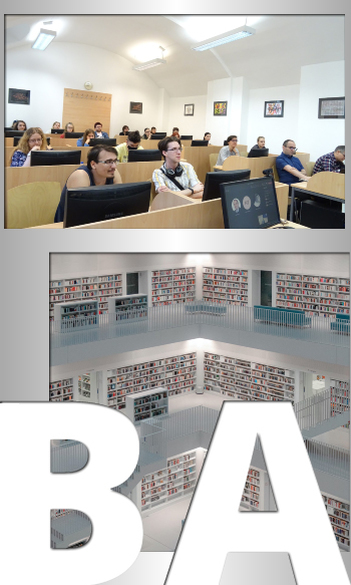BA - bachelor’s programme

Practice-oriented BA
Every semester, our programme is enhanced by expert lecturers and guest speakers from different research fields, who provide a picture of the complementary aspects of library and information science.
In addition to learning the basics of library and information science, our courses in cultural history, knowledge management, management and information technology complement the theoretical education with practice-based competence development.
Our IT resources are constantly expanding, for example with digitalisation equipment, allowing students to scan in 3D.
Several courses prepare students to work in national libraries, specialised and academic libraries, municipal or public libraries (also referred to as "the city’s living rooms"), school libraries and other special collections.
Our main focus is on cultural, communication theory and technical approaches to information technology, networking and digitisation, theoretical and practical issues regarding information sources, scientific databases, modern forms of information and the challenges of the market economy in the era of the information society and globalisation.
In addition to use on site, there is considerable need for professionals from public institutions that increasingly offer remote access services, and the profession of librarian offers the opportunity to pursue an extremely useful and innovative career as an expert, developer and researcher in the private sector.
Advancement and career opportunities
By the end of their BA studies, the majority of our students have already built up professional relationships, and after obtaining their degree (or even before), they can find a job in the libraries, archives, museums, art and cultural centres and other cultural institutions that they got to know through their internships or work placement programmes.
Typical roles: bibliographer, digital content developer, children's librarian, collection manager-librarian, IT librarian, information officer, document manager, office administrator, office manager, school librarian, manuscript archivist, coordinator, cultural manager, research support librarian, museum collection manager, reading service librarian, old book librarian, system librarian, information librarian, textbook consultant, music librarian.
With competences acquired in the collection, organisation and publication of information, as information communication specialists, they can be employed in the competitive sector in positions requiring IT, data and database management skills, at publishers or even in the media, in roles providing information services that support economic activity.
According to the Graduate Career Tracking System, approximately 50% of our graduates start their careers in libraries in the public sector and 50% start in the private sector".
The degree can therefore be very valuable on the job market, or students can continue their studies: we welcome our students who have completed the bachelor’s to the master's programme, and then to the country's only doctoral programme in library and information science, where they can obtain a PhD.

